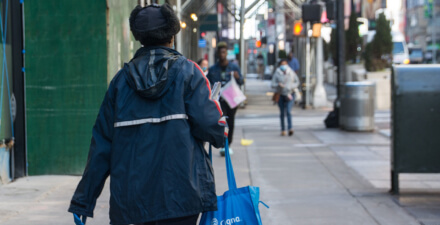Brad DeLong: Worthy reads on equitable growth, May 5-11, 2020
Worthy reads from Equitable Growth:
- If you missed this last week, you need to read it, and you need to read it right now. U.S. inequality of opportunity and the results are now very deadly indeed. Read Liz Hipple, “New congressional reports underscore structural inequalities driving U.S. racial disparities in coronavirus infections and COVID-19 deaths,” in which she writes: “Consider Wisconsin, where only 6 percent of the population is black but African Americans make up 25 percent of the confirmed cases and 39 percent of death … Data on how native Americans are becoming infected and dying has been scarce—a longstanding issue of native people made invisible by data gaps—but what data there are suggest that they, too, are disproportionately suffering from COVID-19 … Occupational segregation means that African American and Latinx workers are disproportionately represented in low-wage occupations that can’t be done remotely and are now on the front lines of essential work. They have to continue to show up to work even though it means exposing themselves—and the families they return to after their shifts end—to possible infection … Black Americans are more likely to suffer from pre-existing health conditions, such as hypertension, heart disease, and asthma … In part, these higher rates of co-morbidities are due to their greater likelihood of living in poverty, as lower socioeconomic status is associated with worse health outcomes. Yet prior research has already made clear that income alone cannot explain racial disparities in health outcomes.”
- Much more attention should be being paid to the skews in the economic pain being caused by the coronavirus recession. Read Heather Boushey and Carmen Sanchez Cumming, “Coronavirus recession deepens U.S. job losses in April especially among low-wage workers and women,” in which they write: “Many of the workers most affected by the swift economic downturn hold jobs that are not classified as essential and cannot be done from home. This month about 90 percent of job losses happened in sectors where less than one in five workers reported in a survey conducted between 2017 and 2018 that they have the option to telecommute. It is likely that this measure somewhat misrepresents the number of workers who have been able to work from home since the onset of the pandemic. Even so, with 7.7 million jobs lost in the leisure and hospitality industry alone, which makes up nearly half of all the jobs in that sector, jobs where workers previously rarely had the option to telecommute accounted for more than a third of this last month’s economy-wide decline in employment.”
- What we know about the importance and the benefits of paid medical leave, compressed and explained by Jack Smalligan & Chantel Boyens in “Paid Medical Leave Research,” where they write: “Paid medical leave may have an effect on health outcomes … [through] improved health management, earlier treatment, greater healthcare utilization, improved income stability, reduced financial stress, and enhanced return-to-work supports. Research on short-term paid sick leave shows clear societal and personal benefits … [In] provid[ing] return-to-work services for newly ill and injured workers … the most effective programs emphasize early intervention following the onset of a new condition or worsening of a chronic condition.”
Worthy reads not from Equitable Growth:
- It really is not too late to turn the coronavirus recession into a sharp V-shaped recession. But I would say that the odds that we are going to do so are less than 10 percent. Only a very small number of people with any access to the levers of power or the megaphones understand that the keys to rapid recovery lie in boosting aggregate demand quickly and by ensuring that businesses are not sent misleading “bankruptcy shut down” signals. Heather Boushey, writing via Medium, understands this. Only a small proportion of other people of status and influence in Washington DC understand this. Read her “It’s not too late to put the American economy on a path to recovery,” in which she writes: “We know what we need to do in a recession. Unemployment Insurance, aid to the states, enhanced nutrition support, direct payments — and infrastructure and job programs — are the tried-and-true programs that stabilize the macroeconomy while supporting America’s families. Decades of evidence show these programs work. Now, in this [next] package, Congress should ensure that the supports we put in place stay in place by crafting them so that they trigger off when the labor market recovers, and not before.”
- A Precis of the thoughts that Bill Davidow and Mike Malone have been having recently on how modern, high-tech, information age capitalism is increasingly finding it much more profitable to create evanescent and ultimately pointless desires then to satisfy durable and important needs. Read their “Dopamine Capitalism,” in which they write: “ It is no secret that with the digital revolution has come many new forms of addiction, as users chase after social-media “likes” and other online stimuli. But less understood is the extent to which most of the tech industry now relies on behavioral manipulation to maximize profits at the expense of our wellbeing … The powerful companies (and, in some cases, governments) that control the Internet have moved from accidentally or unwittingly creating human “robots” to knowingly doing so. Contrary to the usual warnings about artificial intelligence and automation, the biggest near-term threat to humanity is coming not from our machines, but from the people designing them. Those shaping the current technological era have violated the public trust by choosing business models that are openly amoral or even immoral. Following in the footsteps of the tobacco companies and the casino business, they are consciously creating and fostering addictive behavior in the name of profits.”
- Very good news on the practicality and usefulness of a Universal Basic Income—the results of a social experiment from Finland. Read Donna Lu, “Universal Basic Income Seems to Improve Employment And Wellbeing,” in which she writes: “Finland’s universal basic income study has revealed that the program doesn’t seem to disincentivize work: Finland ran a two-year universal basic income study in 2017 and 2018, during which the government gave 2000 unemployed people aged 25 to 58 monthly payments with no strings attached. The payments of €560 per month were not means tested and were unconditional, meaning they were not reduced if an individual got a job or later had a pay rise. The study was nationwide and selected recipients were not able to opt out, as the test was written into legislation. Minna Ylikännö at the Social Insurance Institution of Finland announced the findings in Helsinki today via livestream … Between November 2017 and October 2018, people on basic income worked an average of 78 days, which was six days more than those on unemployment benefits. There was a greater increase in employment for people in families with children, as well as those whose first language was not Finnish or Swedish—but the researchers aren’t yet sure why. When surveyed, people who received universal basic income instead of regular unemployment benefits reported better financial wellbeing, mental health, and cognitive functioning, as well as higher levels of confidence in the future.”






